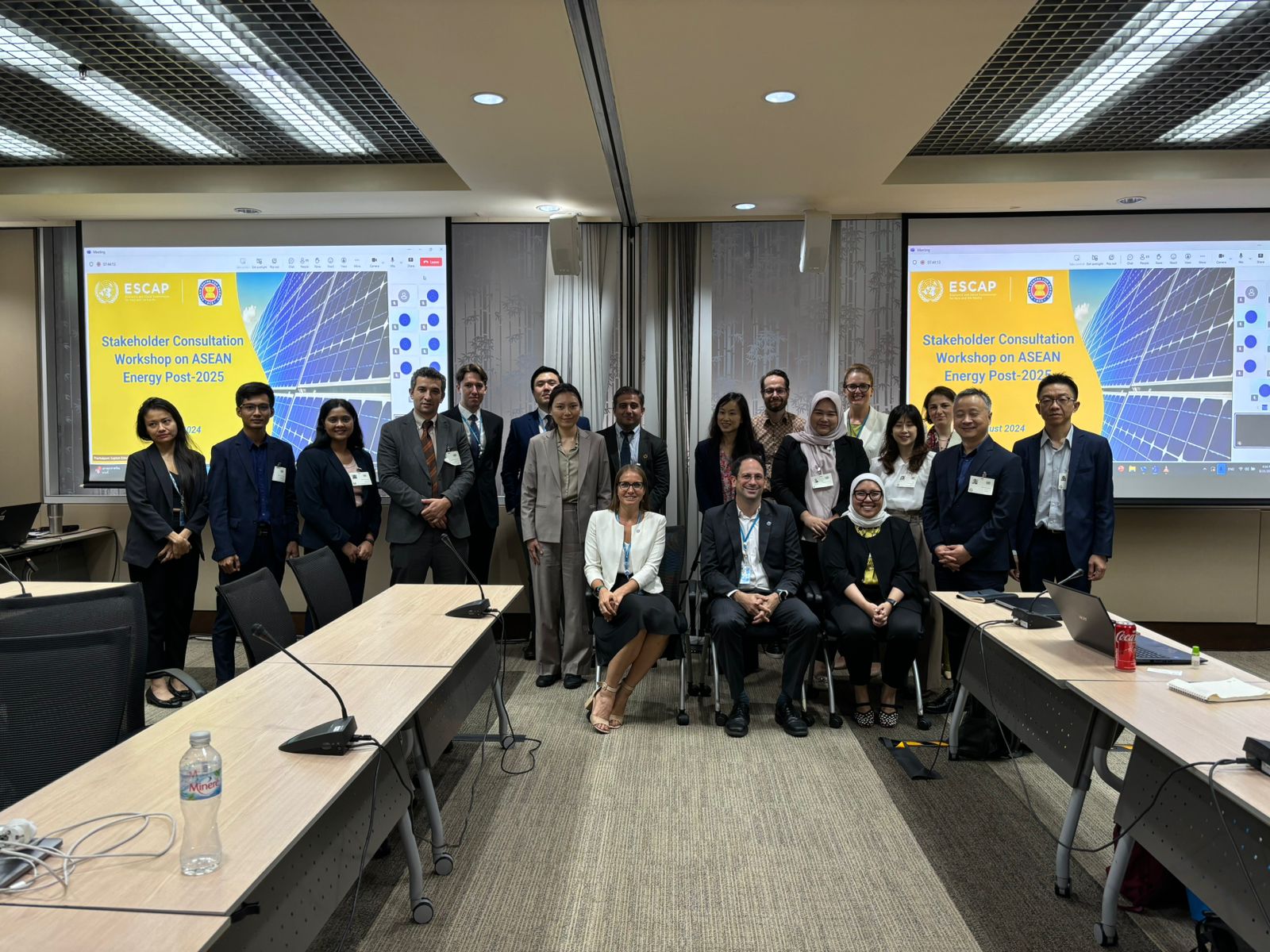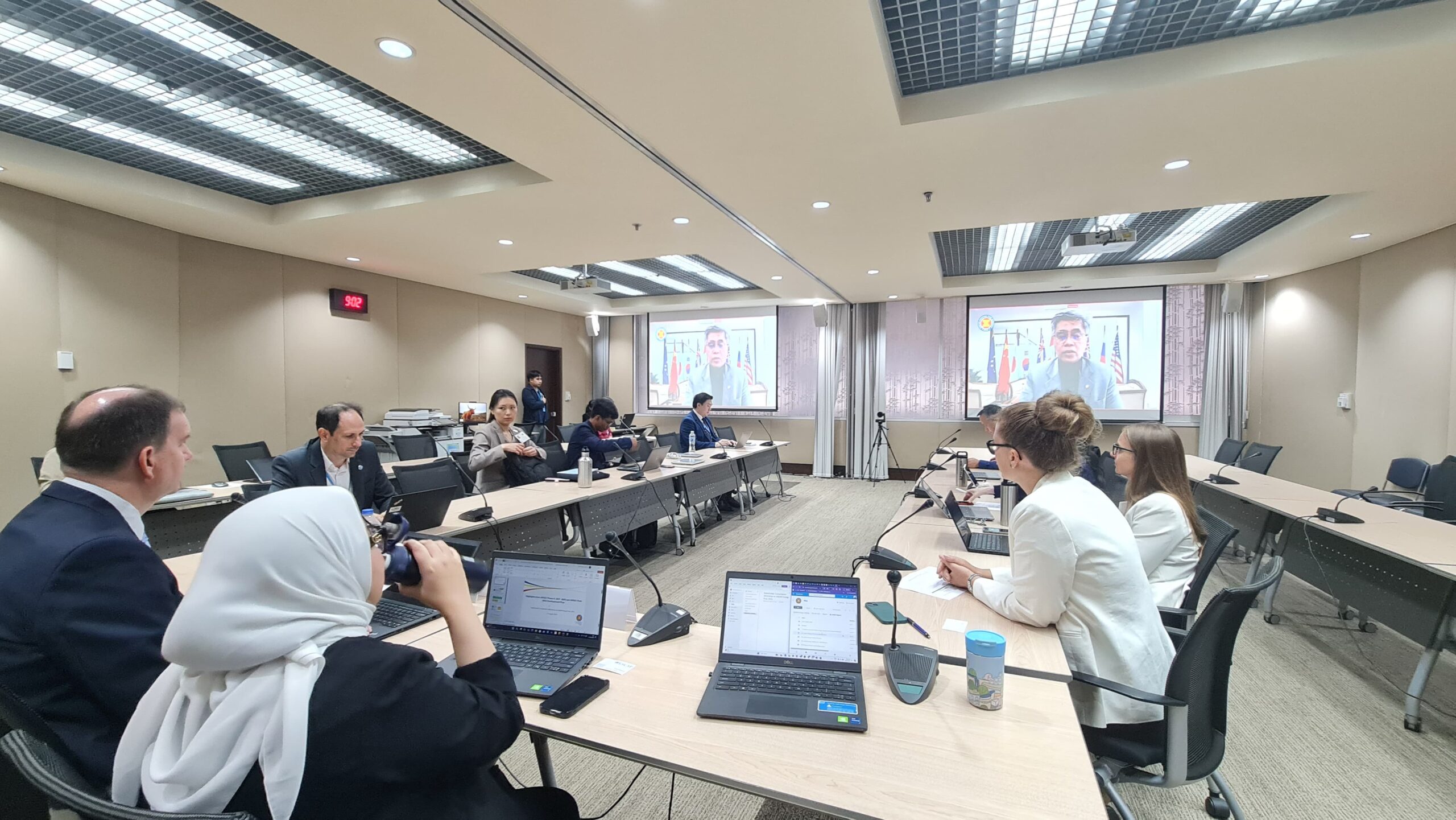Menu

Photo 1. Experts in attendance to the 14th meeting of Expert Working Group on Energy Connectivity
Stakeholder Consultation Workshop on ASEAN Energy Post-2025 organised by ASEAN Centre for Energy (ACE) and UN ESCAP in the United Nations Conference Centre, Bangkok, Thailand took place in 21 August 2024. In conjunction with the 11th meeting of Expert Working Group on Universal Access to Modern Energy Services, Renewable Energy, Energy Efficiency and Cleaner Use of Fossil Fuels (EWG-SDG 7) on 19 August 2024 and 14th meeting of Expert Working Group on Energy Connectivity on 20 August 2024.

Photo 2. Opening Remarks by Dr Nuki Agya Utama, Executive Director of ACE
Dr Nuki Agya Utama, Executive Director of the ACE attended virtually provided the opening remarks. He welcomed the support from UN ESCAP and greeted all experts to support and help ACE in getting new insights in the preparation of post-2025 ASEAN energy policy. ASEAN is currently at the juncture of developing the new policy planning as the current blueprint─ ASEAN Plan of Action for Energy Cooperation (APAEC). Thus, this consultation workshop aimed to fill the knowledge gap coming from various perspectives.
Mr Michael Williamson, Section Chief, Energy Division of UN ESCAP also give his remarks walking us through the key points from the other agendas that may relevant to the discussion. UN ESCAP is elated to support ACE by co-organising this workshop and invited all the various experts, among others, from UN ESCAP, ILO, Stockholm Environment Institute (SEI), Agora Energiewende, World Resource Institute (WRI), ISEAS Yusof Ishak Institute, and DNV.
The consultation workshop aims to achieve several objectives. Firstly, it seeks to assess the key trends in the global energy landscape that are critical to the ASEAN energy sector post-2025. Secondly, the workshop intends to review the current status of the ASEAN energy sector and discuss potential future pathways beyond 2025. Additionally, it aims to facilitate expert exchanges and focused discussions on pursuing ASEAN energy cooperation goals. These discussions will cover topics such as the ASEAN Power Grid, Trans-ASEAN Gas Pipeline, Clean Coal Technology, Renewable Energy, Energy Efficiency and Conservation, Regional Energy Policy and Planning, Civilian Nuclear Energy, and more. Finally, the workshop aims to develop recommendations based on the knowledge and insights gathered to inform the development of the ASEAN energy blueprint post-2025.
The scene-setting presentation includes two parts. Dynta Trishana Munardy, Senior Officer of APAEC at ACE, provides an overview of the Highlights from APAEC Phase II: 2021-2025 and the APAEC Post-2025 Development Plan, elaborating on the timeline and initial draft by the ASEAN Economic Communities plan, which will guide the APAEC Post-2025. This is followed by a presentation on the ASEAN Energy Outlook, focusing on the current renewable energy targets, such as the installed capacity goal of 35% and the total primary energy supply target of 23%. Additionally, it covers the energy intensity reduction target of 32% based on 2005 levels, presented by Amira Bilqis, Analyst of Energy Modelling Policy Planning.
The following sessions begin with a Roundtable Discussion on the review of the latest status on ASEAN regional targets and the way forward, facilitated by Matthew Wittenstein from the Energy Division of UN ESCAP. The discussion points include a reflection on the current ASEAN renewable energy and energy intensity reduction targets, global and regional trends influencing ASEAN target-setting, and the comparison and reshaping of methodologies for the new ASEAN energy targets.
Two breakout sessions are conducted: one focused on “Identification of Potential Cross-Sector Collaborations within the Energy Sectors” which discusses innovative financing energy transition and socio-economic impacts from energy transition e.g., employment, skill gaps, gender, and inclusive policymaking processes and the other on “Innovations and Trends in Low Carbon Technologies for the Next 5, 10, and 25 Years,” which discusses digital transformation in the energy sector, electrification and efficiency in Transportation, and the future of hydrogen.
The acquired insights were noted by ACE to be as reference for the APAEC Drafting Committee.
